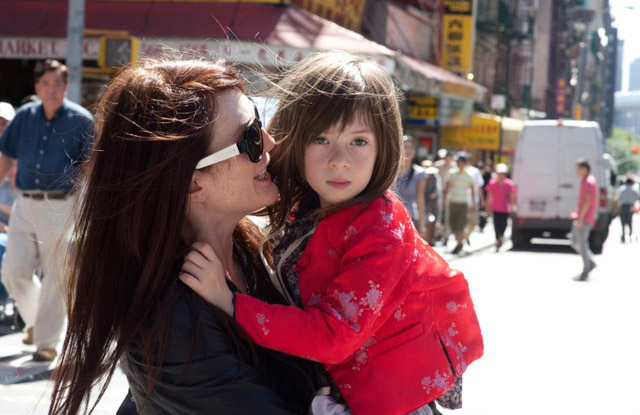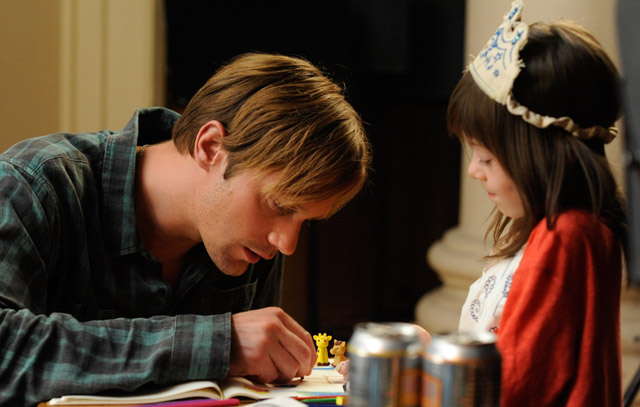CHICAGO – Patrick McDonald of HollywoodChicago.com appears on “The Morning Mess” with Dan Baker on WBGR-FM (Monroe, Wisconsin) on March 21st, 2024, reviewing the new streaming series “Manhunt” – based on the bestseller by James L. Swanson – currently streaming on Apple TV+.
Interview: Directors David Siegel, Scott McGehee of ‘What Maisie Knew’
CHICAGO – The story of “What Maisie Knew” may be unusual, but the reflection of the subject matter fits perfectly within the patterns of contemporary family culture. Directors Scott McGehee and David Siegel create a scenerio in which a custody battle for a little girl named Maisie becomes more about the parent’s egos than her care.
“What Maisie Knew” is amazingly based on a novel by Henry James (“The Turn of the Screw,” “The Bostonians”) written in 1897. Two screenwriters adapted the story into contemporary times 18 years ago, and the co-directors McGehee and Siegel brought it up to date in the post technological age. They worked with a stellar cast, including Julianne Moore, Steve Coogan and Alexander Skarsgard, plus a child actor named Onata Aprile, who brings Maisie to life with heartbreaking sensitivity.
 Photo credit: Millennium Entertainment |
Scott McGehee and David Siegel have been filmmaking partners for 20 years. After making a couple short films in the early 1990s, they self-financed their first feature, “Suture,” which found acclaim in 1994 at the Cannes Film Festival and from director Steven Soderbergh. Notable actors have starred in their smaller, cultish films, including Tilda Swinton (“The Deep End,” 2001), Richard Gere (“Bee Season,” 2005) and Joseph Gordon-Levitt (“Uncertainty, “2008”). “What Maisie Knew” is their fifth feature film.
HollywoodChicago.com discussed the film with the co-directors, whose philosophies were mostly in agreement, except when it came to technology and society (see below).
HollywoodChicago.com: The film is based on an 1897 novel by Henry James. In making contemporary the story of “What Maisie Knew,” what were you and the writing team saying about how we live now?
Scott McGehee: David and I had the advantage or reading the screenplay before we read the novel. The writers adapted it 18 years ago, so in reading the screenplay, the problem we faced was actually updating it from 18 years ago. We’ve moved it from the upper west side of New York City to downtown, changed phone booths to mobile phones – simple, subtle changes. The screenplay was contemporary, but what was really surprising was to go back to the Henry James source novel from 1897 and realize how relevant to our time that novel was.
HollywoodChicago.com: What main elements of the original novel were central to your film, and what shocked you about how the more things change, the more they remain the same?
David Siegel: The fundamental thing that is similar between the book and the film is that it’s told from the child’s perspective – even more so in the film than the book. And that was the challenge, to make a film from a child’s perspective. In filmmaking, it reduces everything to a fundamental level. What Maisie sees, what see doesn’t see, and how the soundtrack music relates to her interior life, it’s extremely refined in the film, through her perspective.
Because of that, it was a film that was continually re-written in a way. We did revisions with the writers at the script stage to make sure we understood the story well enough, because it’s a movie about the experience of a child rather than a plot-to-plot points of the adult’s world. Those ideas get revised, especially at the editing stage, in understanding which pieces need to stay in versus what needed to be left out. It was continual rewriting.
HollywoodChicago.com: How were you able to get the performance you wanted from child actress Onata Aprile [Maisie]? Did you allow her to understand the whole situation or did you break it down into parts?
McGehee: She worked with her mother a lot. Her mother was really good in explaining the story and the emotional stakes within it, and making sure she was comfortable with it and understood what was going on. I think Onata knew the whole story before we started, but day-to-day filmmaking is very incremental, and things get shot out of order, and pieces of scenes are done and then we come back to them later. She couldn’t think of the broad sense of how it fits together, but just work in the moment. In one scene, she’s having breakfast with her Dad, and her Dad is leaving her to go to England. How does she feel about that? It’s those kind of incremental moments that she felt, and felt deeply.
HollywoodChicago.com: All of your principle adult characters brought an air of mystery to their roles. Which of the four characters did each of you sympathize with the most, and what do you think that individual actor brought to the character that others probably could not?
Siegel: I’m just going to choose a character, because I don’t think I sympathize with any more or less with any of the principle adults. Julianne Moore’s character is very hard, a hard edged woman who is very single minded and narcissistic. The resolution that she has with Maisie is fairly sad, and she has a revelation about the relationship she has with her daughter, that forces her to change the situation. It may be forever, in the sense that she can’t hold her in the way she thought she could hold her. What Julianne brings to it, and this is true with all the actors, was the ability to maintain a human vulnerability at the core, even in the worst of moments.
 Photo credit: Millennium Entertainment |
McGehee: I would talk about Alexander Skarsgard. When he arrived on set, his first order of business was to get to know Onata. He understood, smartly, that his character’s relationship to Maisie was fundamental to making the film work. He comes from a big family, and is great with kids. The first time he met Onata, they sat down on the floor of his apartment and started coloring. It was a rehearsal in a way, and also a way to connect to her. They became best friends.
HollywoodChicago.com: How is a professional relationship of nearly 20 years the same as a marriage? How do you both work out conflict when you are on the opposite ends of a decision regarding a film?
Siegel: Whether it sounds true or not, we’ve never had a major conflict on a set, with five feature films and twenty years of working together.
HollywoodChicago.com: How about pre-production?
Siegel: We’ve never had a major conflict in front of other human beings. [laughs] It’s not major conflict even with each other, we have disagreements about creative choices. We decided very early in our relationship, that if we had talked something through and were still at odds about the choice, that we would never make a compromising ‘take turns’ or anything, that we’d simply put those ideas aside and think of a third way. And that’s been invaluable. That third way almost is always a better way than either of the two original ideas. That technique has served us well over the years.
HollywoodChicago.com: What type of flashbacks were you having to you own childhoods as a result of working with and observing the circumstances of the character Maisie?
McGehee: I think the texture of childhood lends itself to a bed of memory and nostalgia that is quite emotional, and we were of course relying of our own sense of what that atmosphere is for a kid.
HollywoodChicago.com: You have technology as an interrupting force in the film, especially mobile phones, which of course weren’t around when Henry James thought up the premise. With both the connection and disconnection of technology, what do you predict will be the course of human relationships when someone like Maisie is an adult?
McGehee: The thing I observe that is heartening to me, is that they’re not falling off a cliff. I see young people who are unplugging a bit, and who aren’t interested in Facebook. I think society is checking itself a bit, and not going down the rabbit hole.
Photo credit: Patrick McDonad for HollywoodChicago.com |
Siegel: That’s ridiculous! The slope is slippery. The speed in which we are absolutely glued to and are interwoven with technological connection is mind boggling. It’s not slowing down or being pared down in any way, it’s just speeding up. It’s the biggest information paradigm shift in human history. It makes the printing press look like nothing. It’s insane. We’re living in the wildest time in the history of civilization. Nothing has changed so fast ever.
HollywoodChicago.com: Your filmography is characterized by explorations into the human psyche. As you have evolved as a team, do you see your own emotional journeys reflecting in the films you choose to do?
McGehee: We often say we’ve not made more films than we made, because we set out to make a variety of films that haven’t happened for this or that reason. The films that get produced, and there are five of them, feels a bit random to us. Why this one, and not that one?
HollywoodChicago.com: Well, has it been a natural evolutionary process?
Siegel: Well, we’re certainly drawn to certain type of stories. That continues to change, so I guess it is evolutionary.
HollywoodChicago.com: In the history of narrative cinema, which one film would you like to remake, and why?
Siegel: That’s an interesting question, because the movies that I love the most I would never think of remaking, because what I love about them are their ineffable specificity, their individuality. Scott and I really love Michael Powell and Emeric Pressburger films. I remember when I saw “A Matter of Life or Death” for the first time, and I thought if only someday we could make a movie that had such imaginative high levels, and as profound and delightful.
McGehee: Similarly to David, remaking films I love would seem impossible. When we made “The Deep End” [2001], there had already been a film version of that material, Maz Ophül’s “The Reckless Moment” [1949]. The big problem in approaching that material is that we loved the original so much. How do we set out to separate our project from a film we adored?
HollywoodChicago.com: We were born a couple of years apart. What particular challenges do you think our generation has faced, and how do you think we’ve contributed to society in our short time on earth?
Siegel: You ask some really big questions.
McGehee: We’re just a couple of filmmakers here. [laughs]
Siegel: Is this a film interview or a U.N. conference? [laughs] Our generation, and the generation before us, has produced very interesting cinema. It’s been more realistic and penetrating than what had existed before. I continue to be amazed by how much movies are able to affect people, and just listening to the reactions of ‘What Maisie Knew’ has been really gratifying. Because people seem to identify so deeply and so personally with either the child or the adults, It causes them to look back and move forward in a different kind of way.
McGehee: I feel like the challenge for our generation is that we had to dig ourselves out of irony somehow. Irony was so much a part of the spirit of the age when I came of age, and it felt like a little bit of a dead end creatively. In a broader sense, the challenge for us was to find a way to re-engage with something – that wasn’t afraid to be direct, earnest and emotional – and yet still was in a space that we felt comfortable in.
 | By PATRICK McDONALD |


